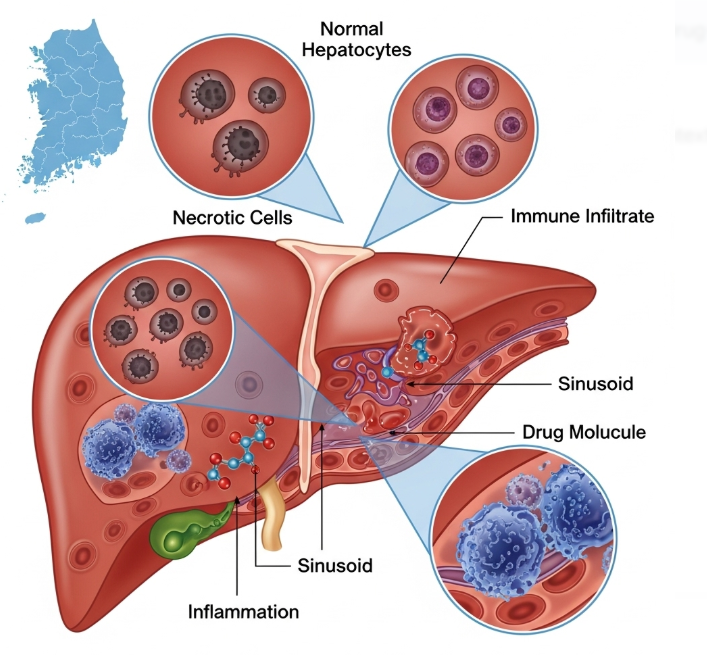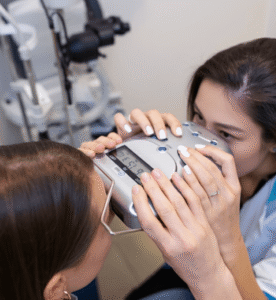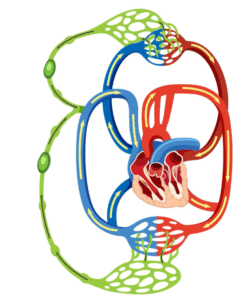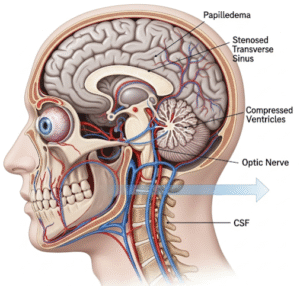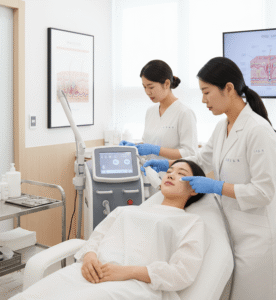Overview
Drug-induced hepatitis (DIH) is liver inflammation caused by medications, herbal supplements, or chemical agents. In South Korea, awareness of DIH is growing due to widespread use of prescription medications, over-the-counter drugs, and traditional herbal remedies. Timely diagnosis and proper management are critical to prevent severe liver damage, liver failure, or chronic hepatitis.
What is Drug-Induced Hepatitis?
Drug-induced hepatitis occurs when a medication or chemical triggers liver injury, leading to inflammation and impaired liver function. It can affect individuals of all ages but is more common in adults using long-term medications or multiple drugs concurrently. Both prescription and herbal medications can be responsible, and the reaction may be unpredictable, depending on genetic, metabolic, and environmental factors.
Symptoms
Symptoms of drug-induced hepatitis can range from mild to severe:
- Fatigue or malaise
- Nausea and vomiting
- Loss of appetite
- Abdominal pain, especially in the right upper quadrant
- Jaundice (yellowing of the skin and eyes)
- Dark urine and pale stools
- Fever in some cases
- Itching (pruritus)
Causes
DIH is caused by liver toxicity from various drugs or substances. Common causes in Korea include:
- Pain relievers such as acetaminophen in high doses
- Antibiotics (e.g., amoxicillin-clavulanate, isoniazid)
- Anti-seizure medications (e.g., valproate, phenytoin)
- Herbal and dietary supplements (especially traditional Korean remedies)
- Chemotherapy drugs
Risk Factors
Risk factors for drug-induced hepatitis include:
- High-dose or prolonged use of hepatotoxic drugs
- Combination of multiple medications
- Pre-existing liver disease (hepatitis B, hepatitis C, fatty liver)
- Alcohol consumption
- Older age or genetic susceptibility
Complications
If untreated, DIH can lead to:
- Acute liver failure
- Chronic hepatitis
- Cirrhosis and long-term liver damage
- Hepatic encephalopathy
- Need for liver transplantation in severe cases
Prevention
Preventive strategies include:
- Regular liver function monitoring during long-term medication use
- Avoiding self-medication and unregulated herbal supplements
- Limiting alcohol intake while on hepatotoxic drugs
- Consulting physicians before starting new medications
- Reporting any symptoms of liver discomfort promptly
Treatment Options in Korea
In South Korea, treatment focuses on stopping the offending drug and supporting liver recovery:
Medical Management:
- Immediate discontinuation of the causative drug
- Hospitalization in severe cases for monitoring and supportive care
- Medications to reduce liver inflammation and manage symptoms
Supportive Care:
- Nutritional support and hydration
- Monitoring liver enzymes and function tests regularly
- Symptom relief for nausea, itching, or fatigue
Specialized Care:
- Hepatology departments in major Korean hospitals like Seoul National University Hospital and Asan Medical Center provide advanced management for DIH
- In severe cases, liver transplantation may be considered
Early recognition, discontinuation of the harmful agent, and proper supportive care are crucial in preventing complications and ensuring recovery in patients with drug-induced hepatitis in Korea.

